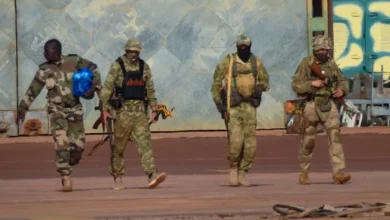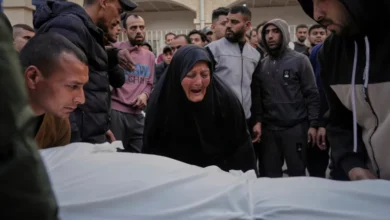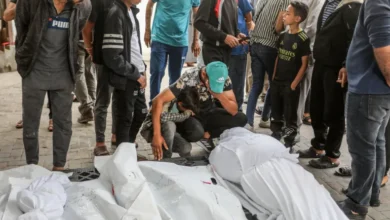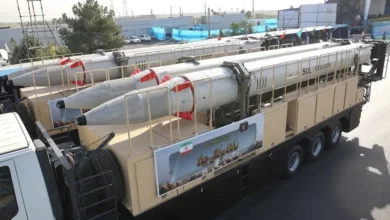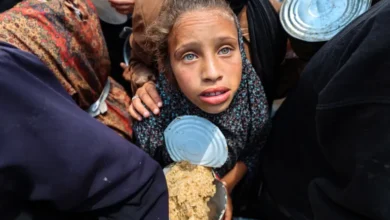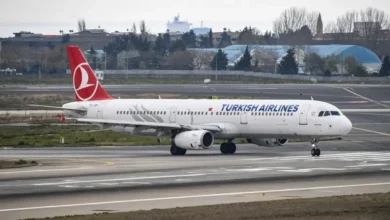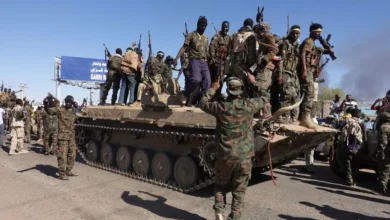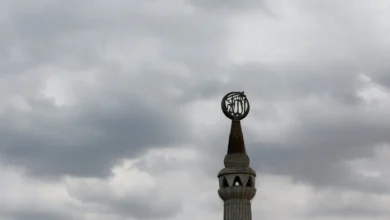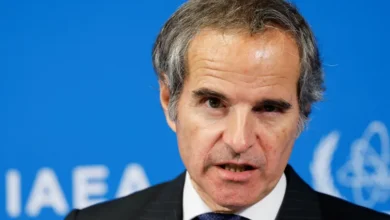Israel-Iran tensions: Explosions as ‘drones downed’ over Isfahan
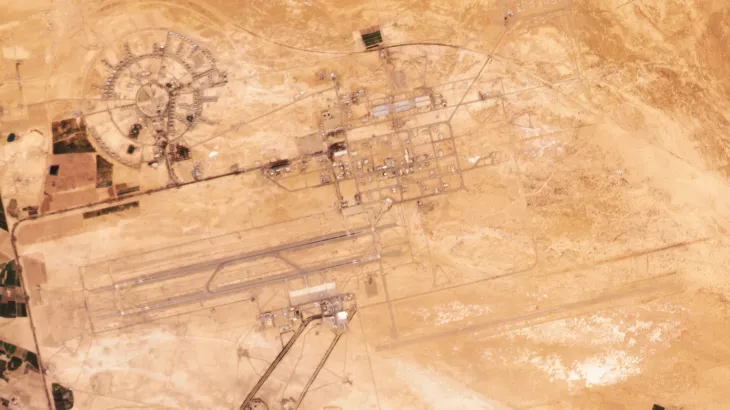
- Iran has fired air defence batteries to shoot down three drones over Isfahan, according to state media, as regional tensions rise following Iran’s retaliatory strike on Israel after an attack against its diplomatic premises in Syria.
- Anonymous United States officials have told US media that Israel launched an attack against a site in Iran, but the Israeli army has yet to comment. Italian foreign minister says US was given last-minute warning about attack on Iran.An investigation is under way to determine where the drones were launched from and who was behind the attack, but according to Iranian officials nothing has been damaged.
The IAEA has also said there is no damage sustained to any of the country’s six nuclear facilities.
Things are still very tense and whether or not this is the final response by Israel is unclear.
But what is clear is that this attack has been successful repelled by Iran and its forces for the time being. Whether or not anything else will happen in the coming hours or days remains to be seen, but for now there doesn’t seem to be any appetite here to further escalate the situation between Iran and Israel.
UN chief says ‘high time to stop dangerous cycle’ of retaliation
In a carefully worded statement that does not mention the latest attack on Iran, Secretary-General Antonio Guterres has said that “it is high time to stop the dangerous cycle of retaliation” in the Middle East.
“The Secretary-General condemns any act of retaliation and appeals to the international community to work together to prevent any further development that could lead to devastating consequences for the entire region and beyond,” Guterres’s spokesman Stephane Dujarric said in the statement.
Five things to know about Isfahan
News of an attack on Iran has brought attention to the central city of Isfahan, which once served as the capital of the Persian Empire during the Safavid dynasty.
In January 2023, a military factory belonging to the Iranian army in Isfahan was also attacked by multiple drones. The province of Isfahan is home to Iran’s main nuclear site, Natanz.
Here are five things to know about Isfahan:
- From 1598 to 1736, Isfahan served as the capital during the rule of the Safavid dynasty.
- Shah Abbas made it his capital and rebuilt it into one of the largest cities in the world during the 17th century, leading to the coining of the phrase, Isfahan nesf-e-jahan ast (Isfahan is half of the world) to highlight the city’s importance as a seat of power.
- The city has a population of approximately 2.2 million, making it the third-most populous city in Iran, after the modern capital, Tehran, and Mashhad, a religious centre in the country.
- Counting the greater Isfahan province’s population of four million, it is considered as the second-largest metropolitan area of modern-day Iran.
- The UNESCO World Heritage site, Naqsh-e Jahan Square, is located in Isfahan. Constructed between 1598 and 1629, it is considered one of the largest ancient squares in the world. Next to it is the Grand Bazaar, one of the oldest and largest bazaars in the Middle East.
Here’s what happened at G7 meeting after attack
The rising tensions in the Middle East dominated discussions as the G7 foreign ministers met in the Italian island of Capri:
- Addressing reporters after the talks ended, US Secretary of State Antony Blinken refused to comment on the reported Israeli attack against Iran, only saying that the US “has not been involved in any offensive operation”.
- Blinken added the G7’s focus is on de-escalation. Asked to describe the current US-Israel relationship, Blinken noted that Israel makes its own decisions, but the US is committed to its security.
- His comments came after Italian Foreign Minister Antonio Tajani said the US told the G7 ministers that it received “last minute” information about the attack on Iran.
- The G7 ministers’ communique, meanwhile, warned of new sanctions against Iran for its April 13 drone and missile attack on Israel and called on both sides to avoid an escalation of the conflict.
Timeline: How Iran-Israel tensions escalated since October 7
Our colleagues in the Al Jazeera Explainers team have put together a comprehensive timeline detailing how tensions between Israel and Iran have escalated since the start of the war on Gaza.
All Blinken says is US not involved in offensive action
Antony Blinken reiterated the message of de-escalation and also said that the US has not been involved in any conflict alongside Israel, in terms of the strikes in the early hours of the morning on Iran.
He wouldn’t be drawn on whether the US had received prior warning from Israel as it’s being reported, therefore whether the G7 ministers themselves had received that warning via US channels, nor he would be drawn on the question of whether he thought that G7 pressure had helped in getting Israel to limit its strike.
The Italian foreign minister, Antonio Tajani, though confirmed that both of those things had happened.
Iran’s army says ready for any further air attacks
Kioumars Heydari, the commander-in-chief of the ground forces of the Iranian army, says Iran remains vigilant to confront any other potential aerial threats.
“If suspicious flying objects appear in the sky of the country, they will be targeted by our powerful air defence,” he was quoted as saying by the state-run IRNA ahead of Friday prayers in Tehran.
“Even though last night’s objects were suspicious, our country’s defences reacted intelligently.”
Heydari also said Iran’s April 13 attacks on Israel “showed that the Islamic republic has the upper hand in the region and can establish security without the interference of any foreign power”.
Lufthansa, subsidiaries suspend flights to Israel amid tensions with Iran
The German airline Lufthansa and its subsidiaries Swiss and Austrian Airlines said all flights to Israel are temporary suspended.
Four flights scheduled between Friday and 7am (05:00 GMT) on Saturday have been cancelled so far, a Lufthansa spokesman told dpa news agency.
US got last-minute warning about attack on Iran: Italy FM
The United States told the Group of Seven foreign ministers that it received “last minute” information about the attack on Iran, Italy’s foreign minister said.
Foreign Minister Antonio Tajani told reporters in Capri that the US provided the information at a morning session that was changed at the last minute to address the attack.
Tajani said the US told the G7 ministers that it had been “informed at the last minute” about the attack.
“But there was no sharing of the attack by the US. It was a mere information.”
He also said that Italians living in Iran were all accounted for and “without problems”.
Iranian president makes no mention of Isfahan attack in new speech
Ebrahim Raisi is on a visit to Damghan, in the central province of Semnan, where he made a speech but made no mention of the attack on Isfahan.
He mostly discussed local affairs, remaining focused on the goals of provincial trips that he has been making across the country since assuming power – but he did talk about the April 13 attack on Israel.
“Operation True Promise led to authority, unity and cohesion in the country,” Raisi said. “Today, all political groups and factions believe that this response was necessary and a big honour for the country.”
Iran’s army has said the Isfahan attack is being investigated and further information will be made public later.
Blinken says US not involved in offensive operation, does not confirm Israeli attack
The US secretary of state, taking questions in Capri, has refused to comment on the reported Israeli attack against Iran.
“I’m not going to speak to that, except to say that the United States has not been involved in any offensive operation,” Blinken told reporters.
‘Desperate attempt’ failed: Iranian MP
Mehdi Toghyani, a member of the Iranian parliament from Isfahan, says the “desperate attempt” from Israel “with the help of local agents” had “failed and brought new disgrace for them”.
“Let them know that we are at peak readiness to protect our dear Iran,” he wrote on X.
Blinken delivers statement
The US secretary of state is speaking to reporters in Capri, where he attended the G7 meeting.
So far, Antony Blinken has yet to mention this morning’s reported Israeli attack in Iran.
He did say, however, that the US is committed to Israel’s security and to “de-escalation” in the Middle East.
Foreign minister says Russia told Israel ‘Iran doesn’t want escalation’
Sergey Lavrov says Russia has held conversations with both the Iranian and Israeli sides.
In an interview with Russian radio stations, the foreign minister said: “There have been telephone contacts between the leadership of Russia and Iran, our representatives and the Israelis.”
He added: “We made it very clear in these conversations, we told the Israelis that Iran does not want escalation.”WATCH: Breaking down attack in Iran
Al Jazeera’s Diplomatic Editor James Bays says Iran appears to be downplaying the suspected Israeli attack.Netanyahu in a ‘sensitive position’
As we previously reported, Ben-Gvir’s one-word posting on X suggesting that Israel was weak in its action has been so far the only comment from a member of the Israeli government on the reported Israeli attack against Iran.
Reporting from occupied East Jerusalem, Al Jazeera’s Bernard Smith said Netanyahu has been in a “sensitive position” as he relies on the support of far-right ministers such as Ben-Gvir to stay in power.
Smith added the Israeli prime minister is currently under a lot of pressure amid increasing street protests from people angry over the handling of the captive crisis.
“So he really needs to keep the far right happy in his coalition because without them – and they keep periodically threaten to pull out – he faces elections, which every poll says he will almost certainly lose,” Smith said.
G7 asks ‘all parties’ to prevent further Middle East escalation
The foreign ministers of the G7 grouping meeting in Italy’s Capri have urged “all parties” to “work to prevent further escalation” in the Middle East.
“In light of reports of strikes on April 19th, we urge all parties to work to prevent further escalation. The G7 will continue to work to this end,” the Group of Seven nations said in a statement.
UAE, Jordan join chorus urging de-escalation
After Germany, Russia and Turkey, among many others, the United Arab Emirates has also called for de-escalation to avoid “serious” repercussions in the region.
Meanwhile, Jordan’s Foreign Minister Ayman Safadi condemned all actions “that threaten dragging the region into war”.
“The focus of the world must remain on ending the catastrophic aggression on Gaza,” he said on X.
More countries call for restraint
The attack in Iran has raised fears of a further escalation in the region. Here are the latest international reactions:
- Russia’s Foreign Ministry says it is looking into reports of the attack and urges all sides to exercise “restraint” to prevent further escalation.
- Turkey’s Foreign Ministry has also called for de-escalation, saying the priority of the international community should be “to stop the massacre in Gaza and to ensure lasting peace” .
- For his part, German Chancellor Olaf Scholz has said that “Everyone must ensure now and in the near future that there is no further escalation of the war”.There has been no comment from Israeli officials so far but that would be keeping with previous times when Israel has been accused of targeting Iranian territory – it neither confirms nor denies it.
We do know of course all week Israel’s war cabinet has been meeting to discuss what level of response it should exercise in response to Iran’s unprecedented attack on Israeli territory on Saturday.
Netanyahu and others in the government said Israel would respond.
Biden asked Israel to “take the win” because Iran’s attack had really caused any damage inside Israel. The British and German foreign ministers also visited Israel with the same message – not to retaliate, but if Israel does to calibrate so that it doesn’t lead to a wider conflagration in the region.
Strike exposes Iran’s security vulnerability: Analyst
Regardless of the extent of the damage, the suspected Israeli strike sends a message to Iran about the vulnerability of its security, according to an analyst of Iranian affairs.
In a brief interview with Al Jazeera, Hamidreza Azizi, visiting fellow at the German Institute for International and Security Affairs, said the incident demonstrates that Iran’s enemies could penetrate even the inner parts of the country.
In a separate social media post, he pointed out that Isfahan “is deep within the country”, which he said could indicate “Israel’s intelligence and operational access, regardless of whether the origin of the attack was internal or external”.
Israel has not officially acknowledged that it carried out the attack on Iran.
Here’s a quick recap
- Iran’s state media says air defence systems have shot down three drones near the central city of Isfahan.
- There has been no reported damage to a nuclear site and a military base nearby.
- US media, quoting US officials, are reporting it was an Israeli attack, but there has been no comment by the Israeli military.
- Syrian state media says Israel carried out a missile strike targeting an air defence unit in southern Syria, causing material damage.
- Israeli officials had promised to hit back after Iran sent drones and missiles towards Israel on April 13.
- That attack was in response for the bombing of the Iranian diplomatic mission in Syria on April 1 that killed seven IRGC members.
Israeli opposition leader slams Ben-Gvir over social media post
“Never before a minister has done such a heavy damage to the country’s security, its image, and its international status,” opposition leader Yair Lapid wrote on X.
“In an unforgivable tweet of one word, Ben-Gvir managed to sneer and shame Israel from Tehran to Washington,” he said.
The opposition leader was referring to a social media post by the far-right security minister suggesting that the suspected Israeli strike on Iran was weak.
Ben-Gvir has been calling for a harsh military response after Iran’s retaliatory attack against Israel on April 13.
UK’s Sunak: Significant escalation not in anyone’s interest
The British prime minister has said that “significant escalation is not in anyone’s interest” in the Middle East.
“It’s a developing situation, it wouldn’t be right for me to speculate until the facts become clearer and we’re working to confirm the details together with allies,” Rishi Sunak said following a speech in central London.
“What we want to see is calm heads prevail across the region,” he added.
Israeli official says Israel carried out Iran attack: Report
As we’ve previously reported, US media have quoted US officials as saying that Israel had carried out the attack.
The Washington Post also quoted an Israeli official as saying that it was Israel’s military that carried out strikes inside Iran in response to the Iranian retaliatory assault on April 13.
The official, who spoke on condition of anonymity to discuss sensitive military matters, said it was intended to send a message to Iran that Israel had the ability to strike inside the country, according to the report.
It also quoted a person familiar with a briefing on the attack, who also spoke on condition of anonymity as they were not authorised to speak about it, describing the strike as “carefully calibrated”.
And what happened on April 13?
The Damascus strike was followed by days of tensions as Iranian officials pledged to take revenge.
Then, on April 13, the response came:
- Iran unleashed a barrage of missiles and drones, marking the first direct strike by Iran on Israeli territory.
- The attack involved more than 120 ballistic missiles, 170 drones and more than 30 cruise missiles, with the launches also coming from Iraq and Yemen.
- There were no fatalities but a girl in southern Israel was wounded by shrapnel from an intercepted drone.
- The Israeli army said it intercepted 99 percent of the projectiles with help from forces from France, the UK and the US.
What happened on April 1?
More than six months into Israel’s war on Gaza, regional tensions have heightened since April 1.
But what happened then?
- On April 1, an air raid struck Iran’s diplomatic mission in the Syrian capital, Damascus.
- The attack killed 13 people, including two Iranian generals and five military advisers.
- Iran blamed Israel, which has been regularly attacking Iranian positions in Syria.
- Israel has neither confirmed nor denied responsibility for that attack.
